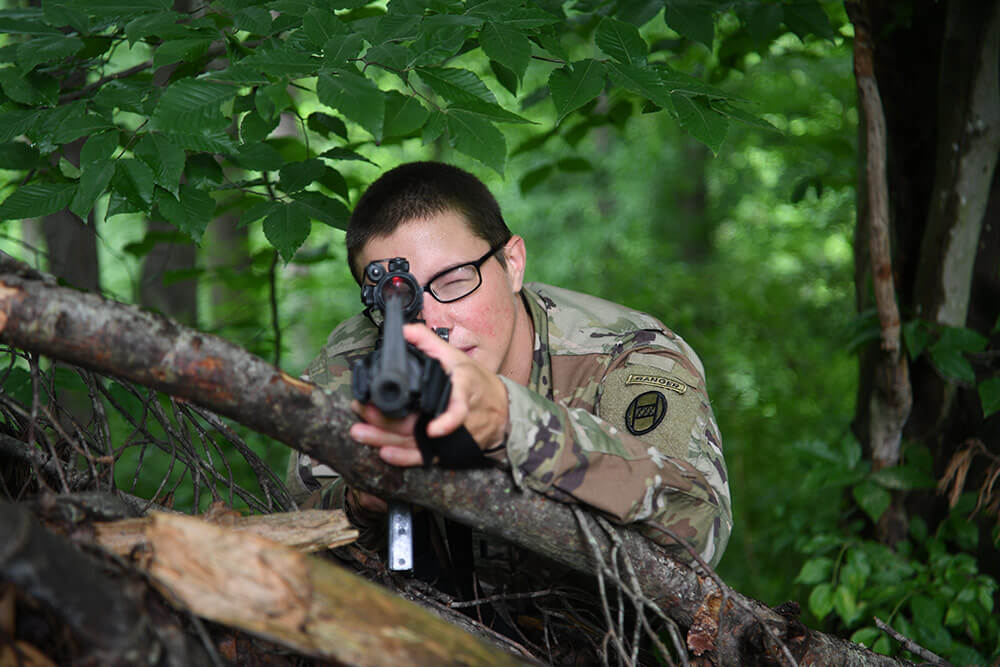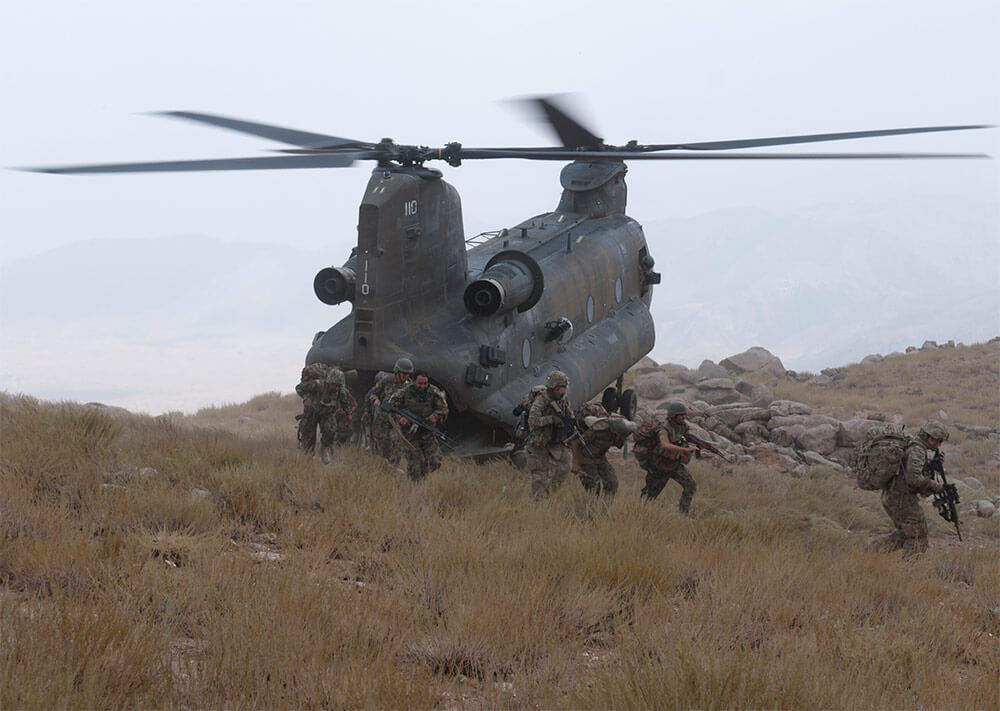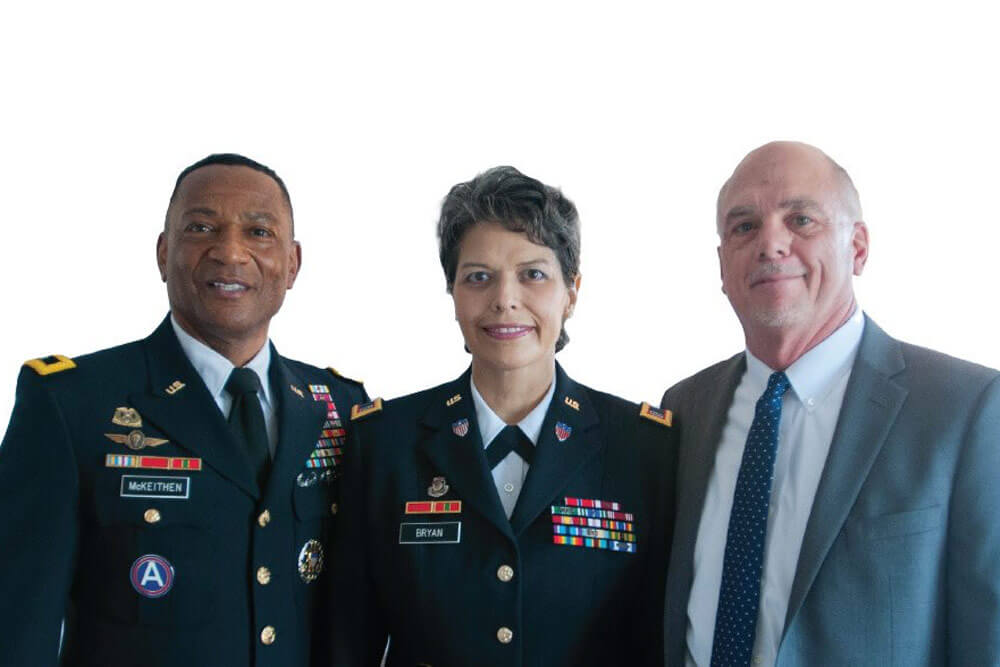Vermont National Guard Excels in Medical Readiness Training
Twenty days, 3 hospitals, 74 patients, 85 hours of care. These are the totals from the 2018 medical readiness training exercise (MEDRETE) conducted as a joint effort between the Senegalese government, U.S. Army Africa and the Vermont National Guard.
A team of 10 Guard medics from the Vermont Army and Air National Guard traveled to Senegal February 4–23 as part of Exercise MEDRETE 18-1, where U.S. Soldiers collaborated with Senegalese medical personnel on procedures and techniques, and provide hands-on health care to local civilians.
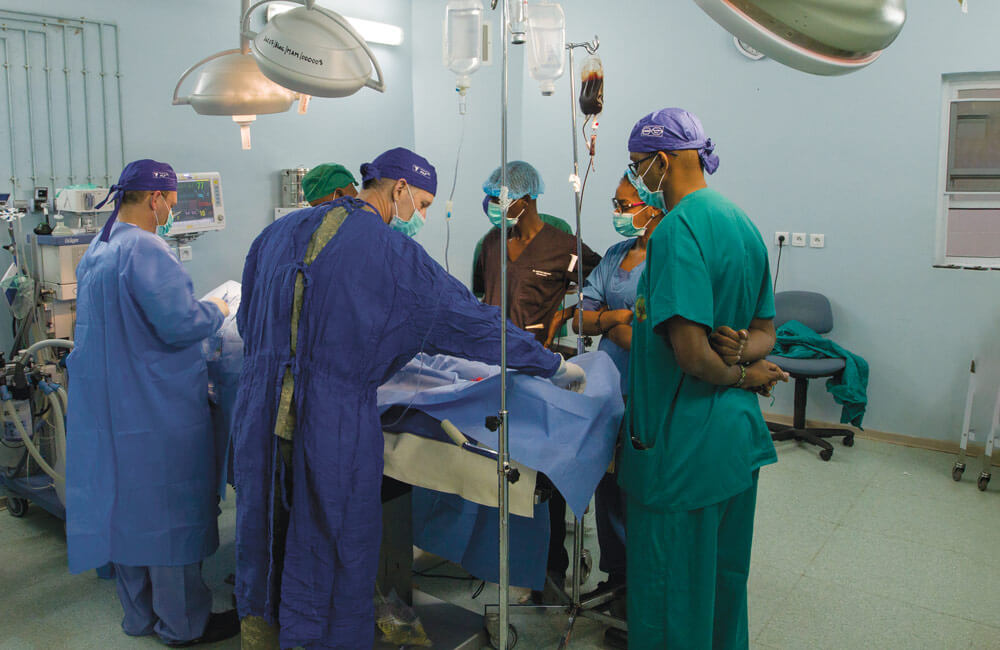
The Vermont National Guard is paired with Senegal as part of the State Partnership Program.
“The overall goal was to engage with our Senegalese counterparts for medic training,” said MSG Bert Severin of the Joint Force Headquarters, Vermont Army National Guard and NCOIC for MEDRETE 18-1. “I’ve gone through many types of exercises and this was really top notch. We were completely engaged the whole time.”
During the exercise, Guard members scrubbed in and assisted on 35 surgeries. The exercise focused on resuscitative care and damage control, trauma and military combat surgeries. However, since it was impossible to anticipate when someone would arrive at the hospital in need of emergency surgery, Soldiers and Airmen also assisted with elective or non-emergency procedures, like hernia and prostate surgeries.
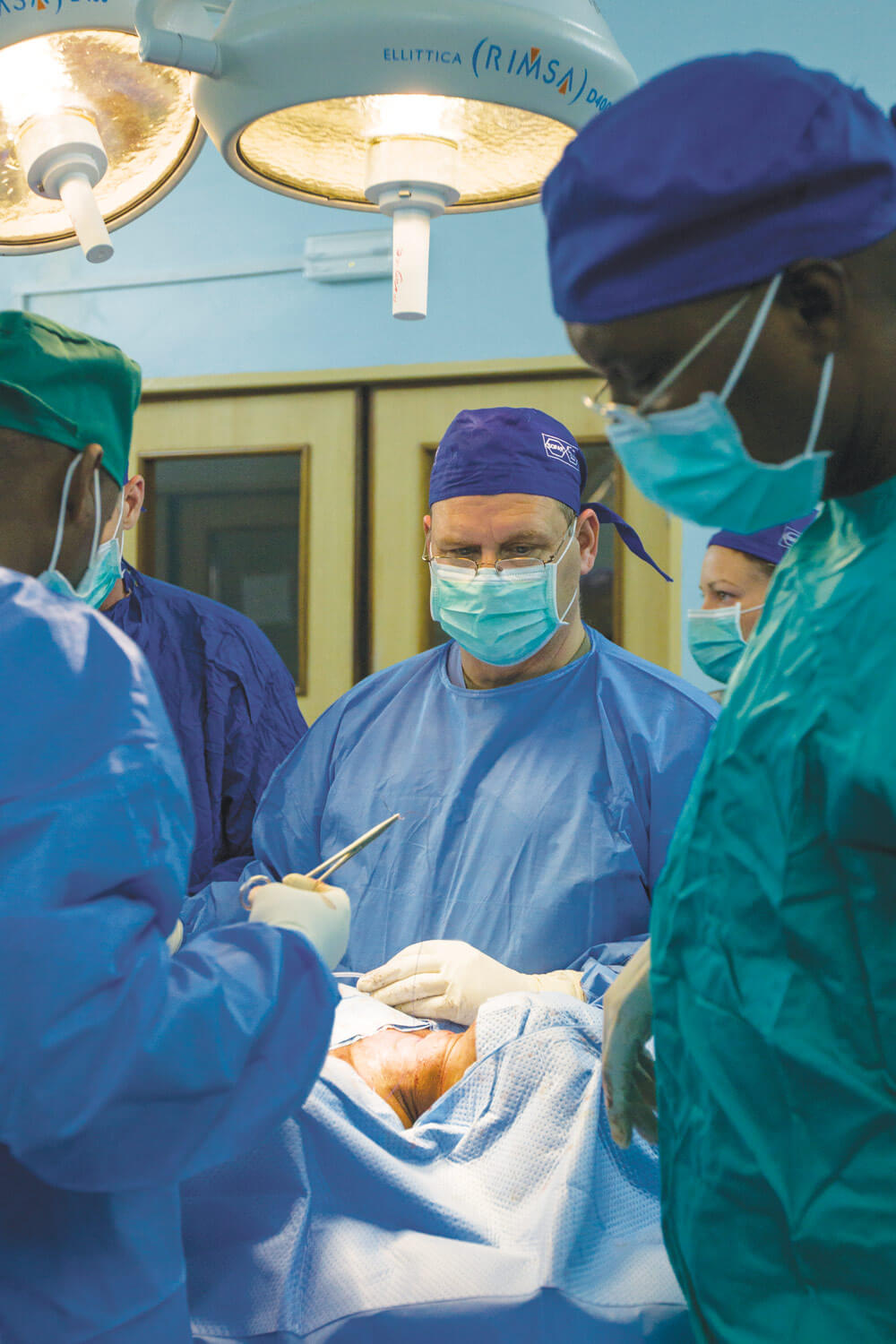
“They let us do more than I could have hoped for,” commented MSG Severin. “We were in surgery every day scrubbing in and working side by side with the doctors and our counterparts.”
“I thought it was amazing,” said SGT Cathy Cappetta, combat medic of Charlie Company, 186th Brigade Support Battalion. “It was a great opportunity. We don’t see this Stateside, especially at the level that we were practicing [in Senegal].”
MSG Severin noted that in addition to assisting in the surgeries, it was rewarding to see patients throughout the entire pre- and post-op process.
“You got to follow up and do rounds along with the [Senegalese] doctor. It’s nice to be able to see it all the way through and to get a smile out of the patient afterwards,” he said.
It is often the case during international exchanges that a language barrier will at some point impact communications. It was no different at MEDRETE 18-1. French is the primary language spoken in Senegal. Some of the Senegalese medics spoke English, and a handful of National Guard members were able to dust off their high school French lessons and speak a few phrases. Differences in dialect were challenging, but not impossible to navigate, said MSG Severin.
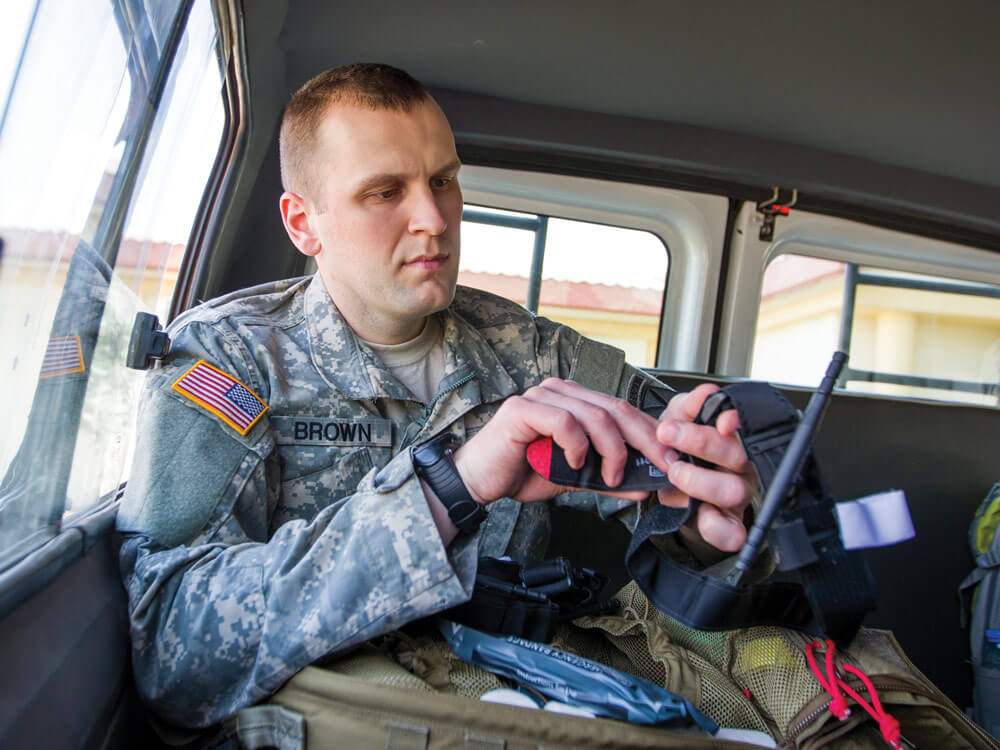
“Doing rounds, trying to figure out the complaint and where it hurts – that was difficult, but so much fun at the same time. People are people no matter where you go, and we all experience aches and pains. There’s kind of an international way of pointing to what hurts and expressing how badly it hurts. Through hand gestures and our limited knowledge of French and English, we made it work,” he remarked.
SGT Cappetta noted that when it came time to perform their medical duties, the Senegalese and Guard members were completely in sync.
“The neat thing was when we got into the OR and it came to common terminology, anatomy and surgical tools, barriers went away. We never used the translator in the OR,” said SGT Cappetta.
She went on to explain that for several of the U.S. participants, herself included, the exchange presented their first opportunity to perform in an operating room.
“To get to see what a liver looks like, what intestines look like, what diseased organs look like – that was really neat because I had never seen a live human body open like that. We got a class on how to suture and then we were in the OR the next day closing on a major surgery,” said SGT Cappetta.
Because Senegal is a resource-constrained environment, their medical personnel have to be tenacious and clever in order to perform successful surgeries with the materials at hand.
“They do more with less,” MSG Severin explained. “They don’t have the same supplies we do. They use their wits more. They are resourceful while still maintaining the best health care possible. They get the job done.”
Guard members learned firsthand how the Senegalese manage to provide for their patients using very few supplies. They paid careful attention, as the resourceful techniques of the Senegalese could prove useful in remote combat environments.
“It translated well to combat medics for when we are in places like Afghanistan where we are going to have to utilize a very little amount of equipment and still do things the right way,” SGT Cappetta said. In fact, she experienced firsthand how a lack of medical supplies forces one to think quick and act fast.
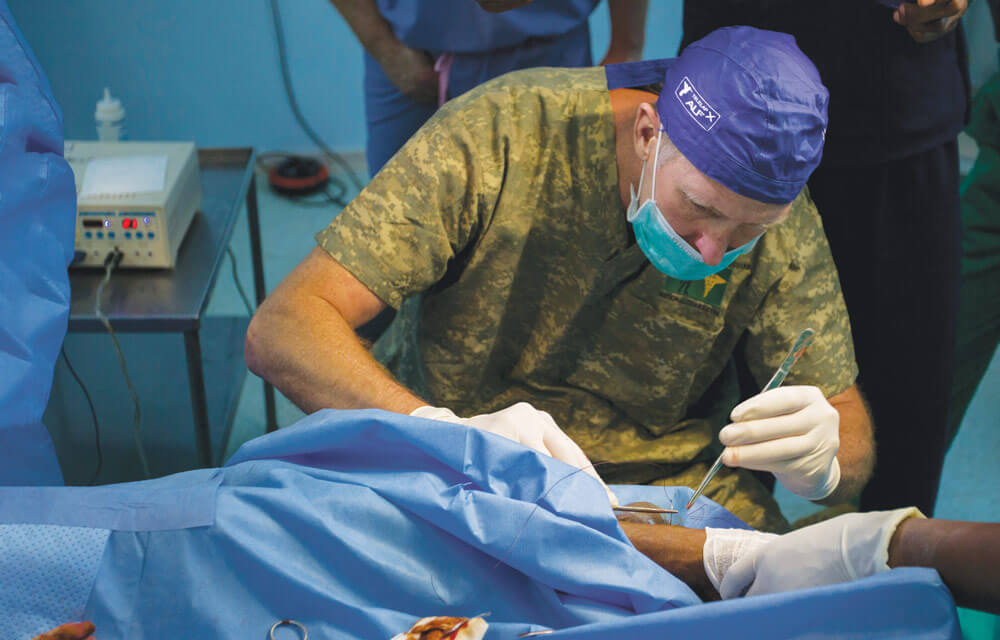
“Because of their lack of supplies and anesthesia, towards the end of one of the surgeries the [patient] on the table started waking up,” said SGT Cappetta. “In the United States, this would be something where you say ‘let’s adjust the anesthesia, let’s put him back under,’ but they looked over to me and said ‘you better hurry up, he’s waking up and we don’t have more anesthesia.’”
This was only her third surgery and she was new to suturing. The pressure was on.
“It was a stressful situation – I had to hurry up and go fast,” said SGT Cappetta. “I [was] being very meticulous and going very slowly, so having that prompt I was surprised that I didn’t think twice about it. I went faster and my sutures went fine. I’ll always remember that experience.”
Also present at the exercise were two biomedical equipment technicians whose focus was on the maintenance and repair of medical equipment. Their work included repairing operating tables and sterilizing equipment in both the military and civilian hospitals. SSG Andrew Whyte, biomedical equipment technician of the Vermont Medical Command, also experienced ingenuity that resulted from needing to work around limited resources and supply shortages.
“We were in a developing country so when something broke, we didn’t necessarily have parts available [to make standard repairs],” said SSG Whyte. “For example, an operating table needed a couple parts that you just couldn’t get there. We went to a local bazaar and bought parts from a solar panel system and that ended up working, which isn’t typically how we would do it in the U.S.”
The U.S. equipment techs also spent time with their Senegalese counterparts teaching them more advanced approaches to medical equipment repair. The Soldiers helped their State partners take basic maintenance skills and cross them over into the medical field.
“A lot of the maintenance guys [in Senegal] are self-taught; they are really building maintenance guys,” SSG Whyte explained. “They know how to rewire electrical outlets and things like that, but we were able to show them that there is more to it than just that.”
The opportunity for the Guard medics to share new techniques with the Senegalese while also gaining new knowledge of their own was at the core of the success of MEDRETE 18-1.
“You go to drills one weekend a month, you do your two weeks of AT, you do it at your own armory, and you go in the woods for a couple of weeks, but you never go overseas until you are deploying. This is a great opportunity to go to an austere environment to do your job [in advance of] a combat deployment,” remarked SSG Whyte.
An important moment for SGT Cappetta came at the end of the exercise when one Senegalese military commander spoke about his original perceptions of the U.S. military, which he had made based on American movies.
“He had an idea that we had a macho attitude,” SGT Cappetta explained.
Working side-by-side with the National Guard quickly changed the commander’s views.
“He called us ‘humble,’” SGT Cappetta said. “He said he was very surprised. It totally changed what he thought about the U.S. military. Hearing that was the most satisfying thing that I think we could have gotten out of it. We changed their perception of what they thought about our entire force.”
After a successful training exercise, the Vermont Guard participants said they are looking forward to a continued sharing of knowledge and strong bonds with Senegal.
“We developed friendships, which is a big part of it,” said MSG Severin. “Senegal is our partner nation. We have a relationship with them. We’ve been going there for 10 years and we’ll continue to go back. Everyone [on this training] was extremely excited to be doing the work we did there, and hopefully we can go back again soon.”
By STAFF WRITER Tatyana White-Jenkins
